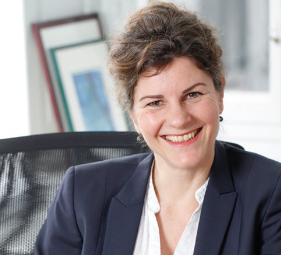Karin Weiss – Judges view
Karin Weiss is the Deputy Managing Director and Head of Grants at the AGE Foundation. She is also one of the judges for the AAL’s first Smart Ageing Prize, which is providing €50,000 to the winning IoT innovation designed for older people. In the first of a series of interviews with the Prize judges, she provides an insight about what she will be looking for from the winning entry
Q. What do you consider to be the challenges older people face in today’s world?
K.W – We are moving towards a more aged society, which means that, collectively, we face new structural needs and challenges in professional and low-threshold care and we need to adopt a completely new understanding about ageing.
Statistically, we face a life-period of 20 healthy years between the ages of 60-80. Historically, this is a prolonged lifespan and it is disrupting our social welfare systems and we need to reconsider how we currently determine policy.
Individually, of course, we all aim to live long and healthy lifestyles for as long as possible. At the same time, however, society faces new questions about social participation, solidarity between generations, environmental challenges and many more challenges. So we need to question our individual and collective identities and look at ways in which we can participate in society and to show responsibility.
Western lifestyles have become much more flexible and individualised. That means freedom on one hand and continuous decision-making options and identity shaping on the other hand.
Age doesn’t make us more equal, but more unequal. Family origin, as well as educational and financial background, impact on health and successful coping strategies in later life. That is why it is very important, that innovations guarantee access for all – they need to contribute to more social inclusion and not exclusion.
Q. How can IoT best address these challenges?
K.W – The way from agile to fragile is very challenging and can cause feelings of being overwhelmed. Smart IoT solutions can reduce these feelings and contribute to a better and gentler ways of coping with the complexities of daily life. Ageing also varies between individuals and so smart ageing products to be adaptable and versatile.
Smart IoT solutions can contribute to making everyday life easier at all levels and for all generations. So, smart ageing products and services must operate on the assumption that that ageing is not a condition, but a lifelong, non-linear and highly individual process.
Q. What are you looking for in the entries to the AAL Smart Ageing Prize?
K.W – A valuable guideline for the development of products and services are the Seven Principles of Universal Design, developed in 1997 by a working group of architects, product designers, engineers and environmental design researchers. If the seven principles are taken seriously, products and services will benefit from large scalability over generations and will avoid unnecessary stigmatisation.
- Principle 1: Equitable use: The design is useful and marketable to people with diverse abilities
- Principle 2: Flexiblity in use: The design accommodates a wide range of individual preferences and abilities
- Principle 3: Simple and Intuitive Use: Use of the design is easy to understand, regardless of the user’s experience, knowledge, language skills, or current concentration level
- Principle 4: The design communicates necessary information effectively to the user, regardless of ambient conditions or the user’s sensory abilities
- Principle 5: Tolerance for error: The design minimises hazards and the adverse consequences of accidental or unintended actions
- Principle 6: Low physical effort: The design can be used efficiently and comfortably and with a minimum of fatigue
- Principle 7: Size and space for approach and use: Appropriate size and space is provided for approach, reach, manipulation, and use regardless of the user’s body size, posture or mobility
When judging the entries we receive for the AAL Smart Ageing Prize, I will pay particular attention to the development and quality of human-machine interfaces. Aspects such as delivery and installation, first level support, training, customer service and assistance by adjustments or updates are important to me.
As a gerontologist, I feel that ethical standards need to be adequately addressed as well. This includes questions such as the consumer’s ability to make informed decisions, for example, on data-ownership, elements of unnoticed surveillance or new and complicated payment models.
The Smart Ageing Prize, a compeititon funded by the AAL Programme, is a welcome incentive which aims to stimulate innovation, with a €50k prize for the best IoT idea to help older people live better, more connected lives at home. Open for entries until May 13, the application process is simple; just visit http://aal.challengeprizecentre.org/ or www.aal-europe.eu

